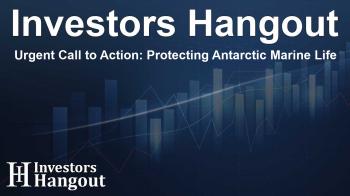Urgent Call to Action: Protecting Antarctic Marine Life

Alarm over Widespread Krill Catch in Southern Oceans
Recent discussions among conservationists highlight alarming news regarding the krill catch in the Southern Ocean. The Antarctic and Southern Ocean Coalition (ASOC) is issuing urgent calls to world leaders in response to reports of staggering krill catches. These unprecedented amounts of krill have raised concerns about the future of marine ecosystems in Antarctica.
Impact on the Ecosystem
As a vital component of the Antarctic food chain, krill serves as a primary food source for various marine animals, including whales, seals, and penguins. Unfortunately, the increasing demand for krill to produce fishmeal and dietary supplements has led to unsustainable catches. With international efforts to protect these marine lifelines faltering, the effects are becoming evident.
Negotiations and Conservation Efforts
Each year, discussions at CCAMLR, the organization responsible for conserving Antarctic marine resources, delve into the future of krill management. Last year's negotiations resulted in a breakdown of protective measures, which allowed for intensified fishing activity in concentrated areas. Claire Christian, ASOC Executive Director, implored that member states are not honoring their commitment to safeguard marine ecosystems amidst accelerating climate challenges.
Urgent Need for New Measures
With the next series of talks scheduled for later this year, there is hope that concrete actions will be established to bolster protections for the Antarctic Peninsula. Stakeholders stress the necessity for new krill fishery management strategies and the establishment of a Marine Protected Area to mitigate the effects of large-scale fishing.
Voices of Concern
Various industry experts have expressed their apprehensions. Dr. Johnny Briggs, with the Pew Bertarelli Ocean Legacy, reminds us that the consequences of overfishing could have dire impacts a myriad of predators reliant on krill. According to him, failing to implement conservation-minded practices could severely harm the marine ecosystem's stability.
As Emily Grilly from WWF-Australia conveyed, Antarctica's delicate balance is threatened. The recent surge in krill catches and the concerning evolution of localized fishing hotspots is an alarming trend that points towards profound dangers for the regional wildlife.
Call for Action
Dr. Horacio Werner from Agenda Antartica echoed similar sentiments, emphasizing the uniqueness of this moment. The unprecedented trigger level reached for the krill catch calls for stringent management protocols to minimize ecological impact. Experts agree that immediate actions are required to preserve critical marine habitats for future generations.
Conclusion and Future Directions
In the wake of these developments, the ASOC is keen on seeing a significant shift in policy to reinforce protections for these marine environments. The international community must confront these urgent challenges and respond with a unified, determined approach. As talks approach, the focus should be on restoring protective measures that ensure the sustainability of the krill stock and the marine life that depend on it.
Frequently Asked Questions
What is the significance of krill in the Southern Ocean?
Krill plays an essential role in the Southern Ocean ecosystem as a foundational component of the food web, supporting many marine species.
Why are recent krill catches a cause for concern?
The recent spike in krill catches threatens the survival of krill-dependent species such as whales, seals, and penguins, creating a potential ecological imbalance.
What are CCAMLR's responsibilities?
CCAMLR manages the conservation of marine habitats in the Southern Ocean, including setting quotas and ensuring sustainable fishing practices.
What actions are conservationists calling for?
Conservationists urge the establishment of new krill management measures and the creation of Marine Protected Areas to better safeguard vulnerable ecosystems.
What can individuals do to help Antarctic marine ecosystems?
Individuals can support sustainable seafood initiatives, advocate for marine protections, and educate others on the importance of preserving marine biodiversity.
About The Author
Contact Addison Perry privately here. Or send an email with ATTN: Addison Perry as the subject to contact@investorshangout.com.
About Investors Hangout
Investors Hangout is a leading online stock forum for financial discussion and learning, offering a wide range of free tools and resources. It draws in traders of all levels, who exchange market knowledge, investigate trading tactics, and keep an eye on industry developments in real time. Featuring financial articles, stock message boards, quotes, charts, company profiles, and live news updates. Through cooperative learning and a wealth of informational resources, it helps users from novices creating their first portfolios to experts honing their techniques. Join Investors Hangout today: https://investorshangout.com/
The content of this article is based on factual, publicly available information and does not represent legal, financial, or investment advice. Investors Hangout does not offer financial advice, and the author is not a licensed financial advisor. Consult a qualified advisor before making any financial or investment decisions based on this article. This article should not be considered advice to purchase, sell, or hold any securities or other investments. If any of the material provided here is inaccurate, please contact us for corrections.

